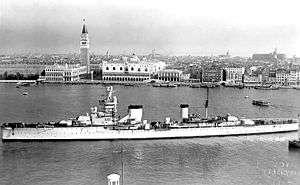Italian cruiser Bartolomeo Colleoni
 Bartolomeo Colleoni at Venice | |
| History | |
|---|---|
| Name: | Bartolomeo Colleoni |
| Namesake: | Bartolomeo Colleoni |
| Ordered: | 1926 |
| Laid down: | 21 June 1928 |
| Launched: | 21 December 1930 |
| Commissioned: | 10 February 1932 |
| Fate: | Sunk by HMAS Sydney and others at the Battle of Cape Spada, 19 July 1940 |
| General characteristics | |
| Class and type: | Giussano-class cruiser |
| Displacement: |
|
| Length: | 169.3 m (555 ft 5 in) |
| Beam: | 15.5 m (50 ft 10 in) |
| Draft: | 5.3 m (17 ft 5 in) |
| Propulsion: |
|
| Speed: | 37 knots (69 km/h; 43 mph) |
| Range: | 3,800 nmi (7,000 km; 4,400 mi) at 18 kn (33 km/h; 21 mph) |
| Complement: | 507 |
| Armament: |
|
| Armor: |
|
| Aircraft carried: | 2 × CANT 25AR (later Ro.43) seaplanes |
| Aviation facilities: | 1 × catapult launcher |
Bartolomeo Colleoni was an Italian Giussano-class light cruiser, that served in the Regia Marina during World War II. It was named after Bartolomeo Colleoni, an Italian military leader of the 15th century.
She was sunk at the Battle of Cape Spada early in the war.
History
Colleoni was launched on December 21, 1930. Bartolomeo Colleoni served in the Mediterranean until November 1938, when she sailed to relieve the cruiser Raimondo Montecuccoli in the Far East. She arrived off Shanghai on 23 December 1938, and remained there until the outbreak of war between Britain and France and Germany. On 1 October, having turned over command in the Far East to the Lepanto, the cruiser returned home, where she arrived on 28 October.
Together with the cruiser Giovanni dalle Bande Nere, Colleoni formed the 2nd Cruiser Division in the 2nd Squadron. Her first operation was a minelaying sortie on 10 June 1940 in the Sicilian Channel, followed by troop convoy cover duties between Naples and Tripoli in July.

On 17 July the ship sailed from Tripoli, accompanied by Bande Nere, bound for Leros in the Aegean, where British activities in Greek waters were causing concern. In the early hours of 19 July, while off Cape Spada (Crete), the Italian squadron, having been reported by RAF aircraft the previous day, was intercepted by the Australian light cruiser HMAS Sydney and five destroyers. During the ensuing engagement Colleoni was struck in the engine room by a shell from Sydney, which knocked out the boilers and immobilised her. This left her an easy target for the torpedoes of the British destroyers HMS Ilex and HMS Hyperion. She sank with the loss of 121 sailors.
Despite their speed advantage, the Italian cruisers failed to outrun Sydney because the most obvious route of escape to the south was to be changed to south-southwest, in order to avoid being trapped between the enemy and the shores of Crete. This gave the Australian cruiser the chance to close the range, as she did. The light armour of Colleoni was unable to defeat Sydney's rounds. The lack of aerial reconnaissance was another factor contributing to the Allies' successful chase.[1]
See also
References
- Notes
- ↑ Greene & Massignani, pp.84-85
- Bibliography
- The Cruiser Bartolomeo Colleoni Franco Gay and Valerio Gay (1988) ISBN 0-87021-900-6
- Greene, Jack & Massignani, Alessandro (1998). The Naval War in the Mediterranean, 1940–1943. Chatam Publishing, London. ISBN 1-86176-057-4
External links
![]() Media related to Bartolomeo Colleoni (ship, 1930) at Wikimedia Commons
Media related to Bartolomeo Colleoni (ship, 1930) at Wikimedia Commons
Coordinates: 35°41′34″N 23°43′14″E / 35.69278°N 23.72056°E